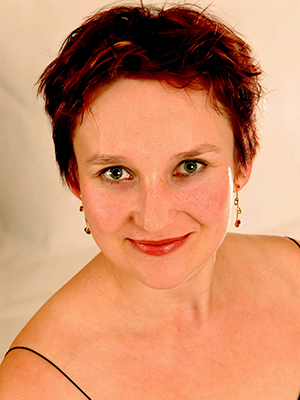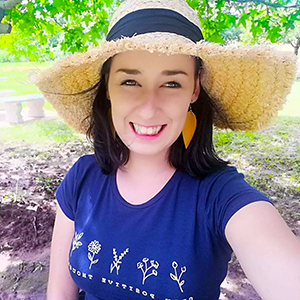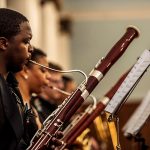The following postgraduate students have completed their studies and will receive their degrees at the next virtual graduation ceremony.
 Polina Burdukova
Polina Burdukova
DMus in Performance (cello)
3 solo and chamber music concert programmes + mini-dissertation:
The interpretation of Hans Huyssen’s Ugubu: a critical hermeneutic analysis through performative research
Promotor: Prof Waldo Weyer
The study is a detailed account of the personal interpretation of Hans Huyssen’s Ugubu (rising and falling … and rising) using critical hermeneutic analysis. As an outcome of practice-based research, an artefact in the form of a sound recording practically demonstrates the analysis. The conclusion is that an intense reflective process is necessary to find a performer’s own perception of the inner picture of the modern composition through the use of practice, research and personal life experience.
 Sharon de Kock
Sharon de Kock
DMus in Performance (violin)
5 solo and chamber music concert programmes + mini-dissertation:
Exploring five professional violinists’ lived experiences of performance-related pain: an interpretative phenomenological analysis
Supervisor: Prof Liesl van der Merwe
The purpose of this interpretative phenomenological analysis was to explore how five professional South African violinists make sense of their lived experiences of performance-related pain. Many violinists play despite experiencing pain and are afraid to speak up because of the stigma associated with being injured. Identity crisis, depression and lack of support are challenges these violinists face. They overcome these challenges through spiritual growth and support from managers, family, friends and doctors. Creating heightened awareness of musicians’ lived experiences with performance-related pain could bring about much needed change and serve as advocacy for pain prevention and support for violinists and musicians.
 Christelle Engelbrecht
Christelle Engelbrecht
MMus in Performance (piano)
cum laude
3 chamber music concert programmes + mini-dissertation:
Understanding the motivations for parental involvement in the practices of the North-West Children’s Choir
Supervisor: Prof Albi Odendaal
The purpose of this qualitative instrumental case study was to understand the motivations for parental involvement in the practices of the South African-based North-West Children’s Choir (NWCC). The problem driving this study was to understand what motivated parental involvement in the practices of a South African children’s choir from a parent’s point of view. The findings revealed the motivations for parental involvement. The emerging themes included a sense of community, and personal benefits which were enabled by a commitment of resources. A model for understanding the motivations for parental involvement in the practices of the NWCC was presented.
 Geruan Geldenhuys
Geruan Geldenhuys
MMus in Performance (flute)
cum laude
3 solo concert programmes + mini-dissertation:
Exploring four experienced string teachers’ understanding of “caring for” their students
Supervisor: Dr Janelize Morelli
I found through the course of my research, and through analysis of the collected data, that the student-teacher relationship can be built on the foundation of having a shared love of and interest in the sound of the instrument being taught within the studio setting. When aligned with a practice of care, the foundation of the relationship within the studio lesson will be beneficial for both parties involved on an emotional and personal level. Greater emphasis should be placed on helping students develop a personal relationship with their instrument, and constructing a growing interest in the instrument, and as such the student’s curiosity will evolve. Teachers should promote a love for the sound during lessons, which will also lead to studio lessons steering more towards developing the essence and meaning of the music being performed, instead of tirelessly working on basic technicalities. I am certain this will then build the relationship of the student and teacher, in other words, building on the shared love of the sound, and overall promotion of the instrument and profession..
 Jaco Jacobs
Jaco Jacobs
MMus in Performance (piano)
3 chamber music concert programmes + mini-dissertation:
Experiencing Christian liturgical music in a Dutch Reformed Church: a case study
Supervisor: Dr Mignon van Vreden
The purpose of this qualitative case study was to understand how traditional and contemporary liturgical music influence the experiences of a representative group of members from a DRC in Potchefstroom in the North-West province of South Africa. The findings revealed immense differences in how each of the participants experienced the Christian Liturgical Music (CLM) used in the various Sunday services and how these participants interacted with the new Contemporary Christian Liturgical Music (CCLM), how they interpreted CLM used within the service as well as what meaning or emotion the familiar or new CLM evoked during the service.
 Laetitia Orlandi
Laetitia Orlandi
DMus in Performance (piano)
4 chamber music concert programmes + mini-dissertation:
Exploring five professional pianists’ spiritual experiences during music-making: an interpretative phenomenological analysis
Supervisor: Prof Liesl van der Merwe
The purpose of this interpretative phenomenological analysis (IPA) was to explore how five professional pianists, employed at tertiary institutions in South Africa, make sense of spiritual experiences during music-making. Data collection was done through in-depth, semi-structured interviews and rigorous data analysis was conducted. Four super-ordinate themes and two unique emergent themes emerged from the analysis of the data. The four super-ordinate themes that emerged from the analysis of the data are:
- Aesthetic sensory experiences;
- Meaningful connectedness with self, music, audience and musicians;
- Unsafe emotional spaces; and
- Sacred experiences.
The two unique emergent themes that emerged from the analysis of the data are:
- “Music is a reflection of our lives”; and
- Music-evoked autobiographical memories.








Congrats to all of you in your successes.
We are proud of you. Well Done!!!